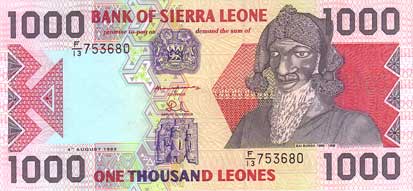 Sierra Leone Paper Money Collection
Sierra Leone Paper Money Collection Sierra Leone Paper Money Collection
Sierra Leone Paper Money Collection
| [ Last Update: Saturday, 17-Oct-2009 20:39:43 EDT ] |
 | Pick# 20 - Bank of Sierra Leone 1000 Leones Note, 1988-1993 Issue, 04 August 1993 Obverse: Bai Bureh at right, craving at lower center, arms at upper center Reverse: Satellite dish antenna at left center Watermark: Lion's head Size: 161 x 74 mm
Bai Bureh (1840 - 1908) was a Sierra Leonean ruler and military strategist who led the Temne uprising against British rule in 1898 in Northern Sierra Leone. As a ruler, Bureh never wanted to cooperate with the British who were living in the capital city of Freetown. Bai Bureh refused to recognise a peace treaty the British had negotiated with the Limba without his participation; and on one occasion, his warrior fighters raided the British troops across the border into French Guinea. On January 1, 1893, the British colonials instituted a ‘Hut Tax’ in Sierra Leone. This tax was issued throughout British controlled Africa. The tax could be paid in either money, grain, stock or labor. Many Africans had to work as laborers to pay the tax. The Hut Tax enabled the British to build roads, towns, railways and other infrastructure amenities in British controlled Sierra Leone. Bai Bureh refused to recognised the hut tax the British had imposed. He did not believe the Sierra Leonean people had a duty to pay taxes to foreigners and he wanted all British to return to Britain and let the Sierra Leoneans solve their own problems. After refusing to pay his taxes on several occasions, the British issued a warrant to arrest Bureh. When the British Governor to Sierra Leone Sir Frederic Cardew offered the princely sum of 100 pounds as a reward for his capture, Bai Bureh reciprocated by offering the even more staggering sum of five hundred pounds for the capture of the Governor. In 1896 Bureh declared war on British in Sierra Leone. The war later became known as the Hut Tax War of 1898. Most of Bureh's fighters came from several temne villages under his command, as well as fighters from Limba, Loko, Kissi and Kuranko villages who were sent to his aid. Bai Bureh's men not only killed the British soldiers, but also killed dozens of Krios who were living in Northern Sierra Leone because it was thought by the indigenous people of Sierra Leone that they supported the British. One of the most notable Krio people that was killed by Bai Bureh's warrior fighters was Krio trader John 'Johnny' Taylor who was killed in his house in Northern Sierra Leone because it was thought (by the indigeneous people of Sierra Leone) that he supported the British. Bai Bureh had the advantage over the vastly more powerful British for several months of the war. By 19 February, Bai Bureh's warrior fighhters had completely severed the British line of communication between Freetown and Port Loko. They blocked the road and the river from Freetown. Despite their arrest warrant, the British forces failed to defeat Bureh and his warrior fighters.
|